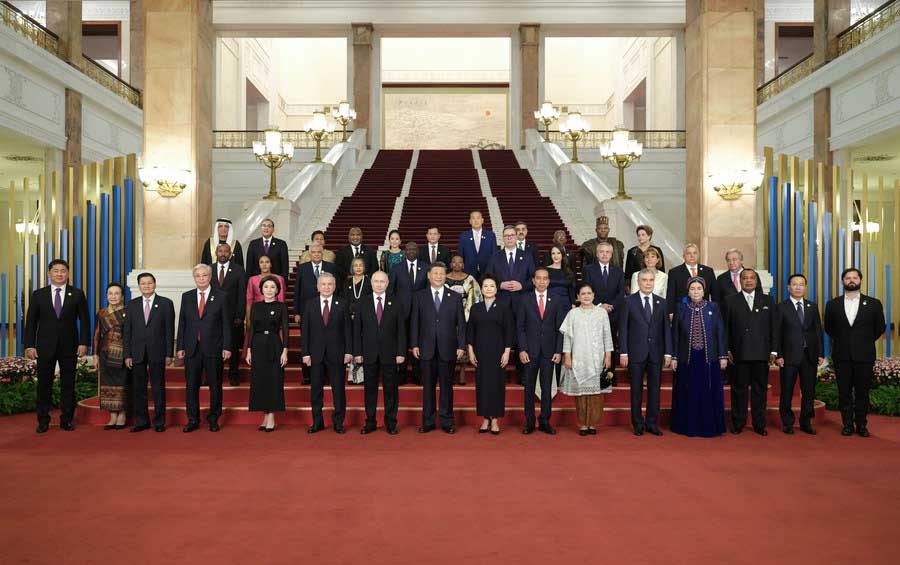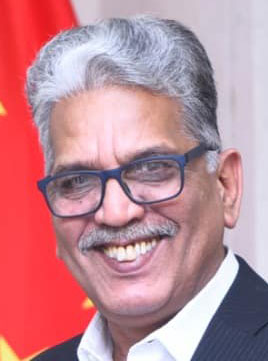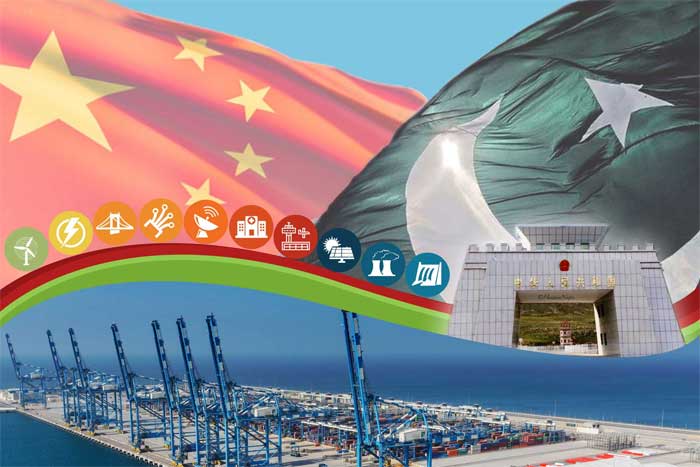
(BRF2023) Xi announces major steps to support high-quality Belt and Road cooperation
BEIJING: Chinese President Xi Jinping on Wednesday announced eight major steps China will take to support high-quality Belt and Road cooperation.
First, China will build a multidimensional Belt and Road connectivity network, Xi said in a keynote speech at the opening ceremony of the third Belt and Road Forum for International Cooperation (BRF).
The country will speed up high-quality development of the China-Europe Railway Express, participate in the trans-Caspian international transportation corridor, and host the China-Europe Railway Express Cooperation Forum, the president said.
He noted that China, together with other parties, will build a new logistics corridor across the Eurasian continent linked by direct railway and road transportation.
“We will vigorously integrate ports, shipping and trading services under the ‘Silk Road Maritime,’ and accelerate the building of the New International Land-Sea Trade Corridor and the Air Silk Road,” he said.
Second, China will support an open world economy, with its total trade in goods and services expected to exceed 32 trillion U.S. dollars and 5 trillion U.S. dollars respectively in the 2024-2028 period, Xi said.
He said the country will establish pilot zones for Silk Road e-commerce cooperation, and enter into free trade agreements and investment protection treaties with more countries.
The country will remove all restrictions on foreign investment access in the manufacturing sector, he said.
Efforts will be made to further advance high-standard opening up in cross-border service trade and investment, expand market access for digital and other products, and deepen reform in areas including the state-owned enterprises, digital economy, intellectual property and government procurement, the president noted.
The country will hold the Global Digital Trade Expo annually, he said.
Third, China will carry out practical cooperation for the BRI. The country will promote both signature projects and “small yet smart” livelihood programs, the president said.
He vowed more financing support for BRI projects on the basis of market and business operation, noting that the China Development Bank and the Export-Import Bank of China will each set up a 350 billion yuan (48.75 billion U.S. dollars) financing window, and that an additional 80 billion yuan will be injected into the Silk Road Fund.
China will carry out 1,000 small-scale livelihood assistance projects, and enhance vocational education cooperation through Luban Workshops and other initiatives, Xi said, adding that more efforts will be taken to ensure the safety of BRI projects and personnel.
The CEO Conference held during the forum saw the conclusion of agreements worth 97.2 billion U.S. dollars, he said.
Fourth, China will continue to promote green development. The country will further deepen cooperation in areas such as green infrastructure, green energy and green transportation, and step up support for the BRI International Green Development Coalition.
“China will continue to hold the BRI Green Innovation Conference, and establish dialogue and exchange mechanisms for the solar industry and a network of experts on green and low-carbon development,” Xi said.
He added that China will implement the Green Investment Principles for the Belt and Road, and provide 100,000 training opportunities for partner countries by 2030.
Fifth, China will continue to advance scientific and technological innovation. China will continue to implement the Belt and Road Science, Technology and Innovation Cooperation Action Plan, and hold the first Belt and Road Conference on Science and Technology Exchange, noted Xi.
The country will also increase the number of joint laboratories built with other Belt and Road parties to 100 in the next five years, and support young scientists from other countries to work on short-term programs in China, he said.
China will put forward the Global Initiative for Artificial Intelligence (AI) Governance at this year’s forum. “We stand ready to increase exchanges and dialogue with other countries and jointly promote the sound, orderly and secure AI development in the world,” Xi said.
Sixth, China will support people-to-people exchanges. China will host the Liangzhu Forum to enhance dialogue on civilizations with BRI partner countries, the president said.
In addition to the Silk Road International League of Theaters, the Silk Road International Arts Festival, the International Alliance of Museums of the Silk Road, the Silk Road International Alliance of Art Museums, and the Silk Road International Library Alliance that have been set up, China has also launched the International Tourism Alliance of Silk Road Cities, according to Xi.
China will continue with the Chinese government scholarship Silk Road Program, he noted.
Seventh, China will promote integrity-based Belt and Road cooperation.
Together with its cooperation partners, China will release the Achievements and Prospects of Belt and Road Integrity Building and the High-Level Principles on Belt and Road Integrity Building, and establish the Integrity and Compliance Evaluation System for Companies Involved in Belt and Road Cooperation, Xi announced.
“We will also work with international organizations to carry out research and training on promoting integrity in Belt and Road cooperation,” he said.
Eighth, China will strengthen the institutional building for international Belt and Road cooperation.
China will work with its BRI partner countries to strengthen the building of multilateral cooperation platforms covering energy, taxation, finance, green development, disaster reduction, anti-corruption, think tank, media, culture and other fields, Xi said.
China will continue to host the BRF and establish a secretariat for the Forum, he said. -Courtesy: Xinhua
Xi stresses cooperation & development
New journey toward another “golden decade” for BRI

Chinese President Xi Jinping on Tuesday hosted a banquet to welcome guests attending a high-profile forum celebrating the 10th anniversary of the Belt and Road Initiative (BRI), stressing cooperation and development in the pursuit of what he called another “golden decade” for the initiative.
“Belt and Road cooperation, robust and fruitful in its first decade, is now full of dynamism and vitality. We must embark with drive and enthusiasm on the new journey toward another golden decade,” Xi told the guests, including state leaders and heads of international organizations, when giving a toast at the banquet held at the Great Hall of the People.
Xi, on behalf of the Chinese government and people and in the name of himself and his wife Peng Liyuan, extended a warm welcome to the guests attending the third Belt and Road Forum for International Cooperation slated for Tuesday and Wednesday.
Representatives from over 140 countries and 30-plus international organizations have confirmed their attendance at the forum. More than 4,000 delegates have registered for participation.
Amid high hopes for seeking common development and prosperity in a world of drastic changes, Xi will work with all participants to draw a new blueprint for high-quality Belt and Road cooperation. He will attend the opening ceremony of the forum and deliver a keynote speech.
At the banquet, Xi struck a strong note on peace, development and cooperation while noting major global challenges.
“The world today is far from tranquil. The world economy is under growing downward pressure. Global development is confronted with multiple challenges,” Xi said. “That said, we remain unwavering in our belief that the historical trend of peace, development, cooperation and mutual benefit is unstoppable, our people’s aspiration for a better life remains strong as ever, and the desire of all countries to achieve common development and prosperity is overwhelming.”
Noting that the Belt and Road cooperation pursues development, aims at mutual benefits, and conveys a message of hope, the president called on political leaders of this generation to shoulder the responsibility of striving relentlessly to deliver benefits for the people today and the future generations.
“As long as we remain steadfast in our commitment to cooperation and common development, we will accomplish new feats in high-quality Belt and Road cooperation that reflect the spirit of the times and will create a better future for humanity through our joint efforts,” he said.
In 2013, Xi unveiled his proposal to jointly build a Silk Road Economic Belt and a 21st Century Maritime Silk Road, dubbed the Belt and Road Initiative.
Since then, the BRI has evolved from ideas into actions and from a vision into reality. By June 2023, China had signed more than 200 BRI cooperation agreements with over 150 countries and 30-plus international organizations across five continents, yielding a number of signature projects and small-scale yet impactful projects.
Lauding the achievements in the past decade, Xi said the BRI has delivered thousands of practical cooperation projects, and produced solid and substantial results.
Upholding the Silk Road spirit characterized by peace and cooperation, openness and inclusiveness, mutual learning and mutual benefit, China and BRI partners have worked together to contribute to global connectivity, build platforms for international economic cooperation, and add momentum to world economic growth over the past 10 years, he said.
Trade and investment have prospered among BRI countries. From 2013 to 2022, the cumulative value of imports and exports between China and BRI partner countries amounted to 19.1 trillion U.S. dollars, with an average annual growth rate of 6.4 percent. Cumulative two-way investment between China and partner countries came in at 380 billion U.S. dollars during the period, including some 240 billion U.S. dollars from China.
Over 3,000 BRI cooperation projects have been launched in the past decade, involving close to 1 trillion U.S. dollars of investment. Many of these projects, such as railways, bridges, and pipelines, have helped build an infrastructure network that connects subregions in Asia as well as the continents of Asia, Europe, and Africa.
None of the achievements of Belt and Road cooperation “simply fell into our laps or were granted by anyone,” Xi said, stressing that they have been made possible by the governments, enterprises and people of participating countries through hard work, wisdom and courage.
“Let us take this opportunity to salute all those who have participated in and contributed to Belt and Road cooperation,” he said.
The banquet was also attended by Li Qiang, Zhao Leji, Wang Huning, Cai Qi, Ding Xuexiang, and Li Xi, all members of the Standing Committee of the Political Bureau of the Communist Party of China Central Committee, as well as Chinese Vice President Han Zheng.
After the banquet, Xi and Peng watched an artistic performance along with the guests to feel the colorful civilizations and splendid cultures of the BRI countries.-Courtesy: Xinhua
Belt and Road Initiative
Paving the way towards shared development and prosperity

In an era marked by unprecedented global interconnectivity, the concept of a global community of shared future has taken center stage. In this landscape, the Belt and Road Initiative (BRI) emerges as a beacon of hope, a path towards shared development and prosperity. The BRI represents not just a conceptual framework but a practical roadmap that promotes ideas central to the present world-development, security, openness, cooperation, civilization, and governance. This ambitious initiative rests on three foundational principles: extensive consultation, joint contribution, and shared benefits.
Extensive Consultation: Fostering True Multilateralism
One of the cornerstones of the BRI is the principle of extensive consultation. This principle underscores that the BRI is not a unilateral endeavor by China but a collaborative effort involving all stakeholders. It promotes authentic multilateralism, emphasizing collective decision-making while respecting the varying levels of development, economic structures, legal systems, and cultural traditions of different nations. All countries, regardless of size and wealth, participate on an equal footing, providing opinions and proposals in bilateral and multilateral cooperation.
This principle encourages economies at different stages of development to reinforce communication, identify innovative cooperation mechanisms, and participate in global governance. By doing so, it seeks to create a platform for dialogue, cooperation, and interconnected development.
Joint Contribution: Collaboration for Shared Development
The BRI is not merely a geopolitical tool or an international aid program. Instead, it is a collaborative effort for shared development. The principle of joint contribution emphasizes the participation of all parties involved and coordination with the development strategies of relevant countries and regions. It seeks to capitalize on each party’s strengths and capabilities to collectively create new opportunities and driving forces for growth.
This principle encourages countries and businesses to engage through various forms of cooperation, such as bilateral, third-party market, and multilateral cooperation. It values market forces and promotes market-oriented operations to meet the expectations of all parties involved. China plays a pivotal role in BRI cooperation due to its economic size, market scale, and experience in infrastructure construction.
Shared Benefits: The Essence of Win-Win Cooperation
The principle of shared benefits underscores the importance of win-win cooperation. It aims to identify common interests, meet the development needs of all parties, and ensure that no participating country is left behind. Most participants are developing countries seeking to leverage collective strengths to address challenges such as inadequate infrastructure, lagging industrial development, and limited capital and technology.
Under the BRI framework, China provides assistance within its capabilities to partner countries and supports other developing nations in accelerating their development. Simultaneously, it aims to foster all-round opening up by building connections with other countries and creating a double development dynamic.
Concepts: Open, Green, and Clean Cooperation
The BRI embodies the concepts of open, green, and clean cooperation, which are essential for inclusive and sustainable development. It emphasizes transparency and opposes protectionism and unilateralism. The initiative welcomes countries from various regions, political systems, and backgrounds to participate, as long as they seek common development.
Green development is a central theme of the BRI, focusing on eco-friendly growth, renewable energy, and sustainable finance. It aims to establish a resource-efficient, eco-conscious, and low-carbon Silk Road, contributing to global efforts to address climate change.
Clean governance is considered vital for the steady development of the BRI. Participants commit to transparency and fight corruption, ensuring that financial resources and projects are managed with integrity and efficiency.
Objectives: High Standards, Sustainability, and Better Lives
The BRI sets ambitious objectives, aiming for high standards, sustainability, and improved quality of life for all participants. It introduces universally accepted rules and standards, promotes high-standard cooperation, and advocates for free trade zones and trade liberalization.
Sustainability is a key focus, aligning with the UN 2030 Agenda for Sustainable Development. The BRI aims to address root causes hindering development, integrate sustainable principles into projects, and ensure debt sustainability.
The initiative takes a people-centered approach, emphasizing poverty eradication, job creation, and the wellbeing of individuals. It encourages deeper cooperation in areas such as public health, poverty reduction, and education, aiming to improve people’s lives.
Vision: A Path to Global Wellbeing
The Belt and Road Initiative offers a path to global wellbeing, characterized by progress, cooperation, and inclusiveness. It promotes peace by fostering mutual respect and cooperation rather than confrontation. It envisions prosperity through win-win outcomes and shared development, rejecting exploitative practices of the past. It champions openness, seeking to create an open global economy that benefits all. And it drives innovation, harnessing technology for transformative advancements. Finally, it promotes social progress by encouraging dialogue, mutual understanding, and coexistence among civilizations.
In short, the Belt and Road Initiative represents a significant step towards a more interconnected, equitable, and prosperous world. By adhering to its principles and concepts, and pursuing its objectives and vision, the BRI holds the potential to pave the way towards a brighter future of shared development and prosperity for all nations involved.




